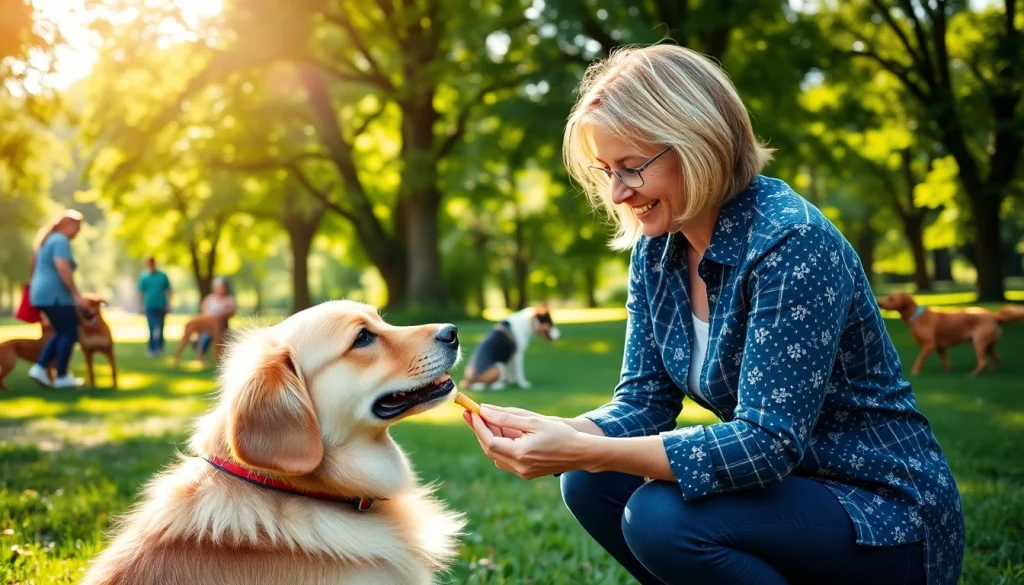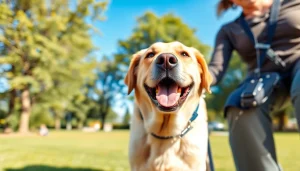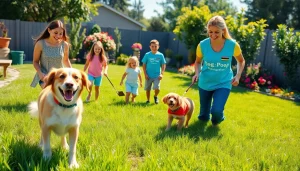Effective Dog Training in Irvine: Techniques, Tips, and Resources for Success

Understanding Dog Training Basics in Irvine
What is Dog Training? The Fundamentals
Dog training is the process of teaching a dog specific behaviors or tasks, typically using various techniques and methods to promote desired actions and reduce unwanted behaviors. At its core, dog training involves establishing communication between the owner and the dog, fostering a relationship built on understanding and trust. Training can encompass basic commands like “sit” and “stay,” as well as advanced skills such as agility training, service work, and behavior modification.
In Irvine, dog training incorporates diverse methods and strategies appropriate to a variety of breeds and individual temperaments. Local trainers often emphasize the importance of positive reinforcement, where successful behaviors are rewarded with treats, praise, or play to encourage repetition of those behaviors. Understanding these fundamentals is crucial for any dog owner, particularly in an urban setting like Irvine, where distractions and social environments can create additional challenges in training.
Why Dog Training is Essential for Pet Owners
Engaging in dog training is not merely a choice for pet owners; it’s essential for fostering a well-adjusted, obedient, and happy dog. Trained dogs not only behave well in public and at home but also lead happier lives as they understand what is expected of them. Proper training can prevent behavioral issues, reduce the likelihood of accidents, or mishaps, and create a safer environment for both the dog and its human companions.
Moreover, dog training contributes to enhanced socialization, which is particularly crucial in a bustling city like Irvine. Through training sessions, dogs learn to interact appropriately with people, other dogs, and various stimuli in their environment. Owners who prioritize training often see a more profound connection with their pets, leading to reduced stress and increased satisfaction in their roles as guardians.
Choosing the Right Training Method for Your Dog in Irvine
When it comes to selecting a training method, owners in Irvine encounter a plethora of options, including traditional obedience training, clicker training, and socialization strategies. The suitability of a specific method often depends on the dog’s age, breed, and previous experiences. For instance, puppies might benefit more from positive reinforcement surrounded by other dogs, whereas older dogs could require behavior modification techniques if they have developed negative habits over time.
It’s also essential for owners to consider their personal training philosophy. Some may prefer a more structured approach, while others might gravitate toward a natural, flexible style. Evaluating local resources, such as those offered by Dog Training Irvine, can provide insights into various training methods and help owners find a qualified trainer who aligns with their goals.
Exploring Popular Dog Training Services in Irvine
A Review of Local Dog Training Facilities
Irvine boasts a rich array of dog training services tailored to meet the needs of both novice and experienced dog owners. Notable facilities include Manners for Mutts, which emphasizes positive reinforcement tactics, and Paw Sweet Paw, offering various week-long training programs tailored to specific goals like basic obedience or behavioral correction.
Another popular option is Wags & Wiggles, which combines training with daycare and boarding services and provides various classes for different dog ages and skill levels. Each facility has its unique approach and specialties, whether it’s focused on puppy training, advanced obedience, or specific behavioral issues like aggression or anxiety. Evaluating these facilities often entails visiting them, observing classes, and asking trainers about their methods.
Group Classes vs. Private Lessons: What’s Best for You?
When deciding between group classes and private lessons in Irvine, several factors come into play, including the dog’s temperament, the owner’s experience, and specific training goals. Group classes can benefit socialization, allowing dogs to learn in a stimulating environment alongside their peers. However, they may not address individualized concerns, especially for owners facing unique challenges.
Conversely, private lessons provide tailored training sessions focused singularly on the dog’s needs, allowing for more targeted learning and immediate feedback. This one-on-one training can be particularly beneficial for owners dealing with behavioral problems or complex training goals. Owners should assess their dog’s personality and their training objectives when making this choice.
Comparing Prices: Affordable Options for Dog Training in Irvine
Dog training in Irvine varies in cost based on the type of service provided, with options ranging from affordable community programs to premium training facilities. Basic group classes typically cost between $150 and $300 for a series of sessions, while private lessons may range from $100 to $150 per hour depending on the trainer’s experience and the training’s complexity.
Many facilities also offer comprehensive packages that provide a volume discount for multiple sessions or programs, making training more accessible to owners on a budget. For instance, Paw Sweet Paw provides bundled training prices for packages of several sessions, allowing better budget management for families. Owners should inquire about any discounts or financial aid options to enhance affordability.
Techniques for Effective Dog Training
Positive Reinforcement: The Key to Successful Training
Positive reinforcement is widely recognized as one of the most effective dog training techniques, encouraging desirable behaviors through rewards. This method involves rewarding the dog immediately after the desired behavior occurs, solidifying the association between the action and the positive outcome. Simple rewards can include treats, praise, or a favorite toy.
For instance, when teaching a dog to sit, an owner might say the command “sit” and, as soon as the dog lowers its rear, offer a treat and praise. Over time, the dog learns to associate the command with the action, making it more likely to repeat the behavior in the future. This approach leads to a more harmonious relationship between the owner and the dog, as it encourages interaction and teamwork rather than fear or punishment.
Dealing with Behavioral Issues: Common Problems and Solutions
Many dog owners encounter various behavioral issues, from excessive barking and jumping to aggression and anxiety. Identifying the root cause of these problems is essential for effective intervention. For instance, excessive barking can stem from boredom, lack of training, or anxiety, necessitating different approaches based on the underlying issue.
Common techniques for addressing behavioral issues include the use of desensitization and counter-conditioning, where the dog is gradually exposed to the triggering stimulus in a controlled manner, paired with positive reinforcement. Behavioral challenges benefit significantly from professional intervention, especially if they involve aggressive tendencies or complicated anxiety disorders. Consulting local experts in Irvine can provide owners with effective strategies tailored to their specific issues.
Training Tools and Accessories to Enhance Learning
Incorporating the right training tools can facilitate a more successful training experience for both dogs and their owners. Essential accessories include leashes, harnesses, collars, and clickers, among others. Training collars, such as those equipped with bells or gentle reminders, can help guide dogs in learning commands without causing discomfort.
Clickers, in particular, are helpful in marking the precise moment a dog executes a desired behavior, allowing for clearer communication. Additionally, training aids like treat pouches or puzzle toys can enhance learning experiences, keeping dogs engaged and motivated throughout the process. Choosing appropriate tools based on the dog’s size, breed, and temperament plays a crucial role in effective training.
Socialization and Its Importance in Dog Training
How to Socialize Your Dog in Public Places
Socialization is a fundamental component of a well-rounded dog training program. Introducing dogs to a variety of environments, sounds, sights, and different people promotes confidence and reduces fear-related behaviors. In Irvine, dog owners can benefit from parks, public events, and dog-friendly cafes for socialization opportunities.
A structured socialization process typically starts with controlled introductions to other well-behaved dogs and friendly people. Gradually increasing exposure can help the dog grow accustomed to various stimuli, ultimately preparing them for everyday situations in public. It’s essential for owners to monitor their dog’s behavior during socialization experiences and offer positive reinforcement for calm interactions.
Evaluating Socialization Classes Available in Irvine
Many dog training facilities in Irvine offer specialized socialization classes aimed at improving a dog’s comfort level in varied settings. These classes often feature controlled group settings where dogs can interact based on structure and guidance from trainers. Facilities such as Wags & Wiggles and Good Dog OC provide options tailored to different age groups and socialization experience levels, ensuring all dogs receive appropriate exposure.
When evaluating socialization classes, owners should look for programs that emphasize safety and gradual exposure to new experiences, helping dogs build confidence effectively. Additionally, observing a class before enrolling can provide insights into the training style and how instructors manage different dogs in a mixed environment.
The Impact of Proper Socialization on Long-Term Behavior
Proper socialization in the early stages of a dog’s life leads to long-term benefits for behavior and well-being. Dogs that receive ample social exposure are often less prone to developing anxiety, aggression, and fear-based reactions towards unfamiliar stimuli later in life. This positive impact extends to relationships with other pets and humans, making dog ownership a more enjoyable experience.
Additionally, well-socialized dogs are generally better companions, as they can participate in various activities without exhibiting undesirable stress behaviors. This broadens opportunities for enjoyable outings, playdates, and other pet-inclusive experiences. Irvin dog owners must prioritize socialization as a core aspect of their training strategy to promote a more harmonious coexistence within the community.
Continuing Education for Dog Handlers
Resources for Advanced Dog Training Techniques
For dog owners interested in expanding their training knowledge beyond basic obedience, numerous resources are available in Irvine and online. Many trainers host workshops and seminars focused on advanced techniques, such as agility training, scent work, and therapy dog training. Additionally, reputable online platforms provide digital courses covering various aspects of dog training, each designed to cater to specific skill levels and interests.
Books focused on dog behavior, positive reinforcement, and advanced training methods can also serve as excellent resources for self-education. Reading about effective techniques helps dog owners implement them practically. Local pet stores frequently host training classes that continue with various specialized topics, providing ongoing education opportunities for dedicated owners.
Networking with Other Dog Owners and Trainers in Irvine
Building a network of fellow dog owners and trainers can profoundly affect personal development as a dog handler. Engaging with others in the dog training community allows for the sharing of tips, experiences, and training techniques, greatly enriching the learning journey. Irvine hosts various dog meetups, training groups, and community events centered around dog welfare, providing ample networking opportunities.
Social media platforms and community forums, such as Facebook groups or local Reddit threads, serve as excellent platforms for connecting and sharing knowledge with other dog enthusiasts. Attending workshops with fellow owners can provide invaluable insights while enhancing camaraderie and support within the community.
Evaluating Progress: Knowing When Your Dog is Ready for More
Tracking progress during dog training is crucial for determining whether to advance to more complex commands or behaviors. Owners should look for consistent execution of commands during practice sessions and observe their dog’s behavior in various environments, noting improvements or areas of ongoing difficulty.
Setting specific, measurable goals is essential for both owners and their dogs, allowing for precise evaluations of success. When a dog consistently responds well to signals and commands in controlled settings, it’s a good indication that they are ready to tackle more advanced training. Trainers and programs specializing in advanced skills can provide guidance in determining appropriate next steps.







